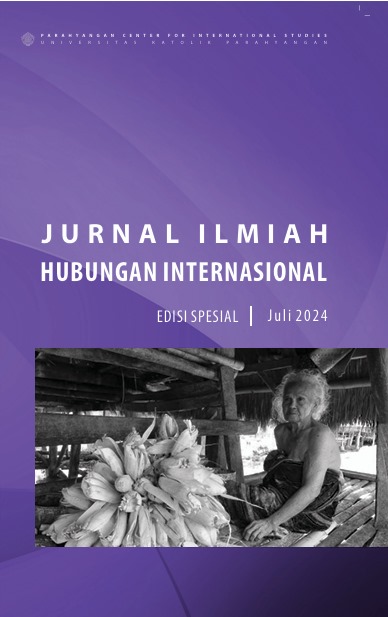Challenging Masculinity: Analyzing the Aspects of Ecofeminism in Aceh’s Female Forest Rangers
DOI:
https://doi.org/10.26593/jihi.v1i1.7815.47-65Abstract
This research discusses the issue of gender and environment in Southeast Asia and focuses on the case
study of Female Forest Rangers or also known as Mpu Uteun in Aceh, Indonesia. It aims to answer the question: how do Female Forest Rangers in Aceh challenge masculinity and apply aspects of ecofeminism in protecting Aceh’s Forest? Using Warren’s approach of ecofeminism, the analysis of this research is divided into three parts. The first is masculinity and men’s role in Aceh’s environmental degradation, second is women and interconnection with nature, and third is ecofeminist philosophy in the case of Aceh’s female forest rangers. This study found that first, perpetrators of deforestation are mostly men as it is one of their ways to make a livelihood, enforcing a masculinity perspective that men should be dominating in providing for their family, including dominating the environment. Second, the female forest rangers have strong interconnections with nature since all the categories of interconnectedness between women and nature according to Warren can be found in this case
study. Lastly, this case study can be claimed as an example of ecofeminist philosophy because the three aspects of Warren’s ecofeminist philosophy can be found in the research. These aspects are feminism; local and indigenous perspective; as well as nature, science, development, and technology.
Keywords: Ecofeminism, masculinity, Aceh, Indonesia, female forest rangers
Downloads
Published
Issue
Section
License
Copyright (c) 2024 Jurnal Ilmiah Hubungan Internasional

This work is licensed under a Creative Commons Attribution 4.0 International License.
This journal uses Creative Commons license (CC BY). We allow readers to read, download, copy, distribute, print, search, or link to the full texts of its articles and allow readers to use them for any other lawful purpose. The author must be aware that the article copyrights will be fully transferred to Jurnal Ilmiah Hubungan Internasional only if the article is accepted to be published in the journal through signing of the Copyrights Transfer Agreement. Authors are allowed to resend their manuscript to another journal or intentionally withdraw the manuscript only if both parties (JIHI and Authors) have agreed on the related issue. Once the manuscript has been published, authors are allowed to use their published article under Jurnal Ilmiah Hubungan Internasional copyrights.





